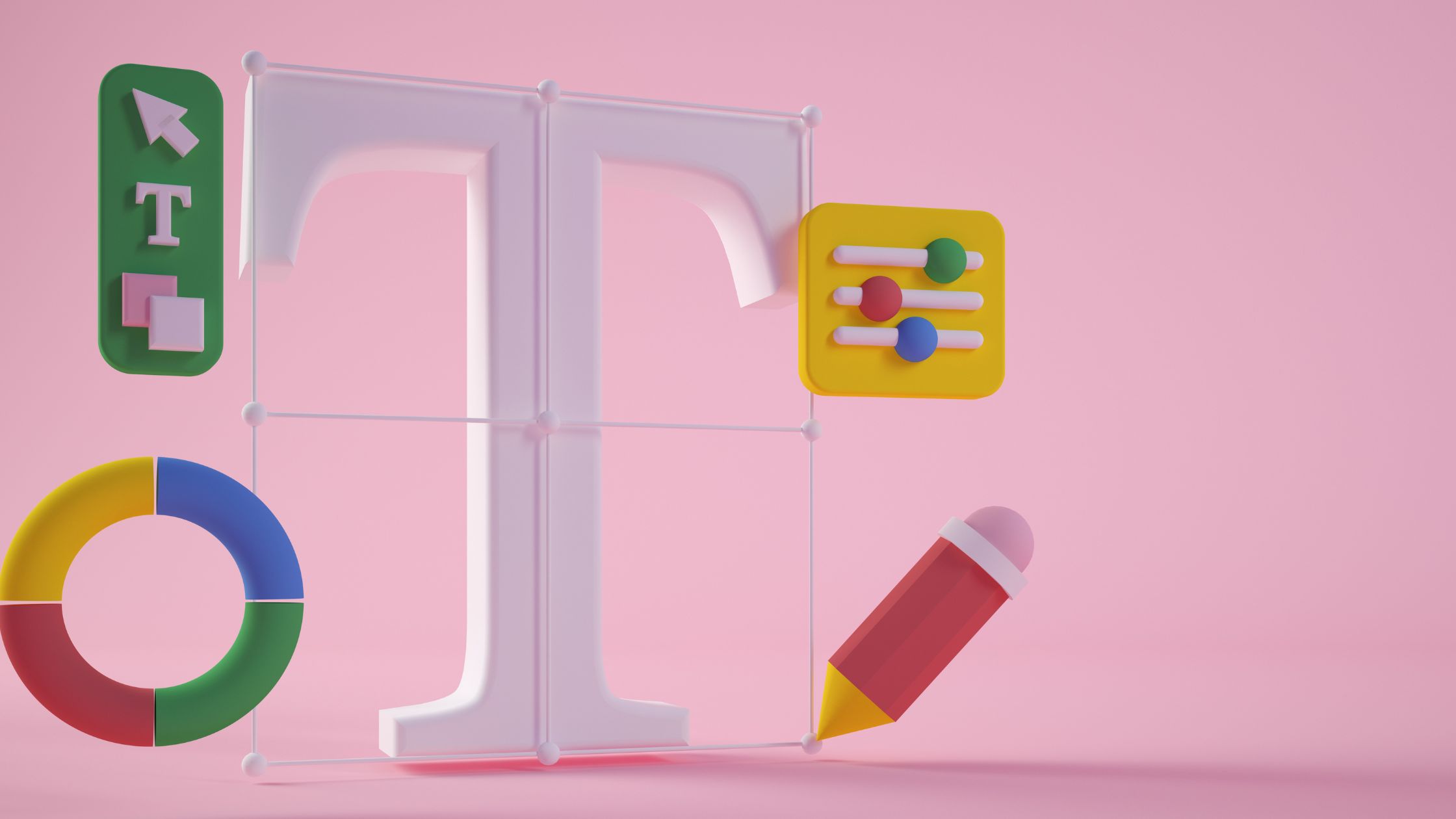Choosing the best graphic design tools can be overwhelming, especially for beginners. With an array of graphic design tools available, it’s essential to choose the right ones that align with your skill level and creative aspirations.
In this guide, we’ll explore the key factors to consider when selecting graphic design software and unveil the top 10 graphic design tools tailored for beginners.
What to Look for in a Graphic Design Software?
Before diving into the specific tools, it’s crucial to understand the essential elements that make graphic design software suitable for beginners.
Versatility in Elements
A good graphic design tool should offer a diverse range of elements, from images and icons to fonts and templates. This versatility allows beginners to experiment and bring their creative visions to life without limitations.
Ease of Use and Learning Curve
For beginners, a steep learning curve can be a significant hurdle. The ideal graphic design tool should have an intuitive interface, a user-friendly design, and resources like tutorials to facilitate a smooth learning experience.
Compatibility and Export Options
Seamless compatibility with different file formats and export options is vital. This ensures that your designs can be easily shared or integrated into various platforms and applications.
Vector Editing Capabilities
Vector graphics are essential for creating scalable and high-quality designs. A graphic design tool with robust vector editing capabilities enables users to create sharp and professional-looking visuals.
Typography Tools
Text is a fundamental element in graphic design. Look for tools that offer a variety of typography options. This allows you to experiment with fonts, sizes, and styles to enhance the visual appeal of your designs.
Collaboration and Sharing
Graphic design often involves collaboration. A tool that facilitates easy sharing and collaboration features streamlines the creative process, especially when working in a team or seeking feedback.
Cost and Licensing
For beginners, cost is a crucial factor. Consider tools with flexible pricing models, free versions, or affordable subscription plans that cater to your budget without compromising essential features.
Top 10 Graphic Design Tools for Beginners
| Pricing | Unique Feature | |
| Adobe Photoshop | ₱1,046.00/mo Annual subscription, cancel within 14 days for a full refund. | Retouching, color correction, and intricate image manipulation |
| Canva | Canva Pro: ₱299.00/mo for one person Canva for Teams: ₱598/mo total for the first 5 people | Drag-and-drop interface with a vast library of templates and design elements |
| Adobe Illustrator | ₱1,046.00/mo Annual subscription, cancel within 14 days for a full refund. | Specializes in creating vector-based illustrations, logos, and graphics |
| Inkscape | Free | Provides powerful vector editing tools for free |
| GIMP | Free | Offers an array of photo manipulation and retouching tools, comparable to Photoshop, but as an open-source software |
| LucidPress | Pro: $3/mo Team: $12/mo Business: Custom | Emphasizes brand consistency by providing templates and design assets tailored for maintaining brand identity across various media |
| Adobe InDesign | ₱1,046.00/mo Annual subscription, cancel within 14 days for a full refund | Ideal for creating print publications, posters, brochures, and eBooks |
| CorelDraw | Annual Plan: $23.75/mo One Time Purchase: $665.00 | Combines vector illustration tools with page layout functionalities |
| Piktochart | $14/mo, billed annually | Focuses on creating infographics effortlessly with pre-designed templates and tools |
| PicMonkey | Basic: $7.99/mo Pro: $12.00/mo Business: $23.00/mo | Offers photo editing features along with customizable design templates suitable for social media graphics and collages |
Now, let’s explore the top 10 graphic design tools that cater to beginners, each offering a unique set of features and capabilities.
Adobe Photoshop
Adobe Photoshop is a powerhouse for image manipulation, retouching, and color correction. Its intuitive interface makes it a go-to choice for beginners delving into the world of graphic design.
Adobe Photoshop is synonymous with graphic design, offering a comprehensive set of tools for photo editing and graphic creation.
| Pros | Cons |
| Extensive retouching capabilities Versatile color correction tools Intricate image manipulation features | Subscription-based model can be pricey for some beginners |
Canva
Canva stands out for its drag-and-drop interface and an extensive library of templates and design elements. It’s a fantastic choice for those who want to create visually appealing graphics without a steep learning curve.
Canva simplifies graphic design with its user-friendly platform, making it accessible for beginners and professionals alike.
| Pros | Cons |
| Vast library of templates and design elements Intuitive drag-and-drop interface Suitable for various design projects | Some advanced features require a paid subscription |
Adobe Illustrator
Adobe Illustrator specializes in creating vector-based illustrations, logos, and graphics. It’s a go-to tool for those venturing into the world of scalable and versatile vector designs.
Adobe Illustrator focuses on vector graphics, providing a platform for creating scalable and high-quality illustrations.
| Pros | Cons |
| Powerful vector editing capabilities Ideal for creating logos and illustrations Seamless integration with other Adobe tools | Subscription-based pricing can be a deterrent for beginners |
Inkscape
Inkscape is a free, open-source tool that provides powerful vector editing capabilities. It’s an excellent option for beginners who want professional-grade design without the hefty price tag.
Inkscape offers a robust set of vector editing tools, making it a compelling choice for budget-conscious beginners.
| Pros | Cons |
| Free and open-source Advanced vector editing features Active community support | Learning curve for beginners new to vector editing |
GIMP
GIMP is an open-source alternative to Adobe Photoshop, offering a range of photo manipulation and retouching tools. It’s a cost-effective solution for beginners looking for powerful graphic editing capabilities.
GIMP provides a suite of photo editing tools comparable to Photoshop, making it a versatile option for graphic design.
| Pros | Cons |
| Free and open-source Comparable features to Photoshop Active community and plugin support | Interface can be less intuitive for beginners |
LucidPress
LucidPress emphasizes brand consistency by providing templates and design assets tailored for maintaining brand identity across various media. It’s an excellent choice for beginners working on projects that demand a unified visual style.
LucidPress streamlines the design process, focusing on maintaining brand consistency across different media.
| Pros | Cons |
| Templates for brand consistency Collaboration features for team projects Accessible through a web browser | Some advanced features require a subscription |
Adobe InDesign
Adobe InDesign is the go-to tool for creating print publications, posters, brochures, and eBooks. It’s ideal for beginners venturing into layout design and print media.
Adobe InDesign excels in page layout functionalities, making it suitable for print and digital publications.
| Pros | Cons |
| Robust page layout tools Seamless integration with other Adobe tools Industry-standard for print design | Subscription-based pricing can be a consideration |
CorelDraw
CorelDraw combines vector illustration tools with page layout functionalities. It’s a versatile tool for beginners exploring both illustration and design layout.
CorelDraw offers a combination of vector illustration and page layout tools, providing a versatile platform for beginners.
| Pros | Cons |
| Comprehensive vector illustration capabilities Page layout functionalities Affordable one-time purchase option | Learning curve for beginners new to vector illustration |
Piktochart
Piktochart focuses on creating infographics effortlessly with pre-designed templates and tools. It’s an excellent choice for beginners looking to convey information visually.
Piktochart simplifies the process of creating infographics with its user-friendly interface and pre-designed templates.
| Pros | Cons |
| Effortless infographic creation User-friendly interface Templates for various infographic styles | Some advanced features require a paid subscription |
PicMonkey
PicMonkey offers photo editing features along with customizable design templates suitable for social media graphics and collages. It’s a user-friendly option for beginners looking to enhance their photos and create engaging visuals.
PicMonkey combines photo editing tools with customizable design templates, catering to beginners seeking a versatile graphic design solution.
| Pros | Cons |
| Photo editing features Customizable design templates User-friendly interface | Some advanced features can be limited in the free version |
Tips for Graphic Design Beginners
Embarking on your graphic design journey? Let’s delve into essential tips tailor-made for beginners to enhance your skills and creative prowess.
- Start Small: Begin with simple projects to build your skills gradually.
- Explore Tutorials: Take advantage of tutorials and online resources to enhance your understanding of design tools.
- Experiment with Design Elements: Don’t be afraid to experiment with different fonts, colors, and layouts to find your unique style.
- Seek Feedback: Share your work with peers or online communities to receive constructive feedback for improvement.
- Stay Consistent: Maintain consistency in your designs to establish a recognizable style over time.
The Final Verdict: What Is the Best Graphic Design Tool?
The choice of the best graphic design tool for beginners ultimately depends on individual preferences, project requirements, and budget constraints. Adobe Photoshop, Canva, and Adobe Illustrator are standout options, each catering to different design needs.
Consider your specific goals, explore the features of each tool, and embark on your graphic design journey with the one that aligns with your creative vision and skill level.
Whether you’re retouching photos, creating vector illustrations, or designing captivating infographics, these tools open a world of possibilities for beginners in the realm of graphic design.

Hi, I’m Mira! I’m a passionate content writer and editor, mostly working on SEO. Being in the biz for nearly three years now, I have an extensive understanding of productivity tools and the users’ needs. These first-hand experiences help me directly connect with the users’ sentiments, translating them into compelling content for audiences across a wide range of industries.
